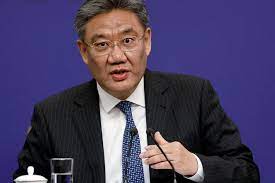Chinese official warns EU on greentech probe

China’s top trade official warned Brussels against protectionism on Friday, saying Beijing was puzzled by EU probes into green tech exports and the bloc’s concerns they threaten the domestic solar panel, wind turbine and electric vehicle industries.
Wang Wentao is travelling through Europe for discussions about the European Commission’s investigation into whether China’s electric vehicle (EV) industry has benefited from unfair subsidies.
“We fail to understand how the EU commission carries the banner of sustainable and green development and then takes protectionist actions, thereby in effect generating more and more risks,” Wang said in some of his first public comments during the European trip.

Speaking at a trade and business conference in the northern city of Verona, he cited the European Union’s investigations into Chinese electric cars, solar panels and wind turbines as examples.
“We must oppose unilateralism and protectionism and protect the global supply chain,” the minister said.
Earlier this week, Wang was in France where he met French Finance Minister Bruno Le Maire.
Also this week, Brussels launched a preliminary review of possible market distortions by Chinese wind turbine makers. The Commission could choose to prohibit transactions or disqualify bids in public tenders.
In its EV investigation, the Commission is expected to decide whether to impose provisional duties by June 5. It would then publish an initial list of companies affected and decide on definitive duties by early November.
Painful memories
European policymakers are keen to avoid a repeat of what happened with solar panels a decade ago when the EU took no action to curb Chinese imports and many European manufacturers collapsed.
Addressing the Verona conference, Italy’s Industry Minister Antonio Tajani, previously a European Commissioner, said the European Commission needed to prevent what he called “environmental dumping”, a reference to selling green technology below the domestic price to gain market share.
He also called for increased trade exchanges and investments between Italy and China. Italy seeks inward investment while Chinese carmakers, pursuing sales of their lower-cost, mostly electric, vehicles in the region are seeking to set up manufacturing sites in Europe.





